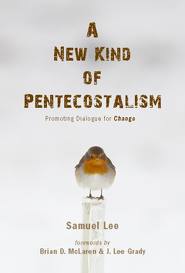I was asked by my friend Kurt Willems to write some reflections on my recent book, A New Kind of Pentecostalism. Here are some of my considerations when it comes to Pentecostalism:
First, even though I titled my book A New Kind of Pentecostalism, I do not necessarily mean that we have to invent something new, which may contradict the basis of Pentecostalism as experienced in the early church. My new kind of Pentecostalism is actually rooted in the old Pentecostalism that is found in the book of Acts —far before we even coined the term Pentecostalism. In relation to this, I do not believe that Pentecostalism is a denomination but rather a trans-denominational, trans-ecclesial, trans-geographical movement within Christianity. Some hardliner Pentecostals may not agree with the way I presented this idea here. This idea that Pentecostalism is a denomination limits the love of God to only a selective group of denominational Pentecostals. Unfortunately, some Pentecostals believe that the Holy Spirit is only found in Pentecostalism as a denomination, and by doing so, they limit the power of the Holy Spirit to a box called Pentecostalism.
This brings me to my second consideration: that the Holy Spirit has never been and will never be limited to a denomination. No church or denomination has an exclusive contract with the Holy Spirit, and no one can claim ownership of the Holy Spirit or of His miracles or manifestations. To me, the Holy Spirit is more than the miracles, signs and wonders claimed by some of my fellow Pentecostals. The Holy Spirit is Love! The Holy Spirit’s first and last manifestation is love, and the Holy Spirit’s miracles are all summarized in one word: Love.
As a Pentecostal pastor, I have been in this movement long enough to say with assurance that I have seen many Pentecostals who pray in tongues and who experience and perform miracles and manifestations and yet are full of arrogance, racism, ethnocentrism, or denomi-centrism.[1] They exclude others; they are overflowing with prejudices, yet they claim they are “filled” with the Holy Spirit. I wonder to which Holy Spirit they are referring.
Third, the Pentecostalism that I promote is about humility and is not a commercialized, Hollywood-esque Christianity, where the hairstyle of the preacher and his/her wealth attracts the attention or where leadership becomes a pyramid system in which the superstar preachers become the new living icons and idols of the Pentecostal believers. I would love to see a Pentecostalism in which people learn to depend on God and on each other through love. I desire to see a Pentecostalism in which the leaders are servants and preachers of humility and grace.
The leadership that makes people dependent on and fearful of leaders is a dangerous leadership, in which questioning is sin and doubting is a sign of weakness. I do not agree with this type of leadership, which I, myself, unfortunately practiced until I had the revelation of change. Pentecostalism needs a serious reformation in its views on leadership. A radical change is needed or else the current system will cause one of the major tragedies in Church history since the Middle Ages—by creating a group of ignorant believers, narrow-minded daydreamers, money worshiping preachers, war-promoting “prophets”, abusive “spiritual fathers”, and self-enriching “apostles”. These trivial groups, however, do not represent the rest of the Pentecostals.
Fourth, I believe in a Pentecostalism that promotes dialogue. I long for a Pentecostalism that reaches the peoples and cultures of the world in their own contextual settings. Finding the elements of Christ in every culture, and even in other religions, is a great challenge and one that the early Church practiced diligently. It is for this reason why the Apostle Paul claimed to be a Jew when among Jews, a Greek with the Greeks, and a gentile with the gentiles: in order to reach them. Fundamentalist Christians, and Fundamentalist Pentecostals in particular, have closed the doors of dialogue with the people or ideas with which they do not agree. However, Jesus was constantly in dialogue with the others.
There are many other topics that I have spoken about in my book, but I want to close this article with my last consideration: Social Justice! The Pentecostalism that I follow promotes Social Justice. This is also found in the book of Acts: caring for the widows, orphans and migrants. I long to see a Pentecostalism that promotes justice and that becomes a voice for the voiceless. I long to see Pentecostals rising, with voices united for justice and grace. I am looking for Pentecostals who will risk their lives to save those in danger, even when they disagree with or disapprove of their ideology or lifestyle.
As a Pentecostal pastor, and a human rights activist, when I see a certain group of people being systematically persecuted by a certain government or institutions, I do all that I can to help them, regardless of who they are. I will try to hide them, like Oscar Schindler or Corrie Ten Boom did. If homosexuals are being persecuted, stoned or killed, it is my duty to stand up for them. If Muslims are persecuted in a certain country, it is my duty to stand up for their rights, and when my fellow Christians or Jews are being systematically destroyed, it is my duty to speak out and help my fellow believers. Even when an atheist is being discriminated by a theocratic system, it is my duty to stand up and speak out against injustice.
Injustice does not know nationality or religious background. An unjust, cruel Christian is as bad as an unjust cruel atheist. I hope the New Kind of Pentecostals will be more sensitive and more active when it comes to promoting justice in the societies in which they live.
Sam Lee
www.samlee.org / www.anewkindofpentecostalism.com
——————————————————————-

I am a husband, a father, a brother, a friend, a Pentecostal pastor, evangelist, sociologist, human rights activist, author and public speaker. My passion is reforming Pentecostalism and for advocating social justice for migrants. I used to be a success oriented, prestige oriented Christian leader, but few years ago I totally changed and my perception about ministry also changed. I am still looking, searching, learning and longing to take Christ’s message as the standard for my life. At least I try.
[1] Denomi-centrism is when a denomination claims to be the rightful Christian church and excludes any other Christian denominations of traditions.












